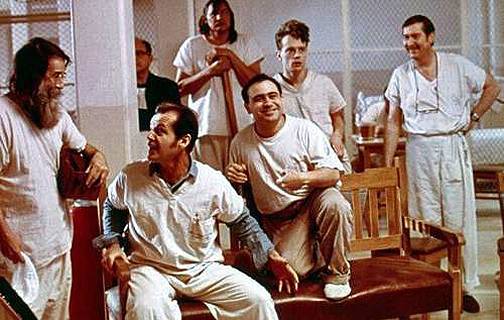Milos Forman’s “One Flew Over the Cuckoo’s Nest” is a film so good in so many of its parts that there’s a temptation to forgive it when it goes wrong. But it does go wrong, insisting on making larger points than its story really should carry, so that at the end, the human qualities of the characters get lost in the significance of it all. And yet there are those moments of brilliance.
If Forman was preaching a parable, the audience seemed in total agreement with it, and I found that a little depressing: It’s a lot easier to make noble points about fighting the establishment, about refusing to surrender yourself to the system, than it is to closely observe the ways real people behave when they’re placed in an environment like a mental institution.
That sort of observation, when it’s allowed to happen, is what’s best about “One Flew Over the Cuckoo’s Nest.” We meet a classic outsider — R.P. McMurphy, a quintessentially sane convict sent to the institution as a punishment for troublemaking — whose charisma and gall allow him to break through to a group of patients who’ve mostly fallen into a drugged lethargy. Their passive existence is reinforced by the unsmiling, domineering Nurse Ratched, who lines them up for compulsory tranquilizers and then leads them through group therapy in a stupor.
McMurphy has no insights into the nature of mental illness, which is his blessing. He’s an extroverted, life-loving force of nature who sees his fellow patients as teammates, and defines the game as the systematic defiance of Nurse Ratched and the system she personifies. In many of the best scenes in the film, this defiance takes the shape of spontaneous and even innocent little rebellions: During exercise period, the patients mill around aimlessly on a basketball court until McMurphy hilariously tries to get a game going.
He also makes bets and outrageous dares, and does some rudimentary political organizing. He needs the votes of ten patients, out of a possible eighteen, to get the ward schedule changed so they can all watch the World Series — and his victory is in overcoming the indifference the others feel not only toward the Series but toward existence itself. McMurphy is the life force, the will to prevail, set down in the midst of a community of the defeated. And he’s personified and made totally credible by Jack Nicholson, in another of the remarkable performances that have made him the most interesting actor to emerge in the last two decades. Nicholson, manically trying to teach basketball to an Indian (Will Sampson) who hasn’t even spoken in twelve years, sometimes succeeds in translating the meaning of the movie and Ken Kesey’s novel into a series of direct, physical demonstrations.
That’s when the movie works, and what it’s best at. If Forman had stayed at that level — introducing his characters and making them real, and then seeing how they changed as they bounced off one another — “One Flew Over the Cuckoo’s Nest” might have been a great film. It’s a good one as it is, but we can see the machinery working.
Take, for example, the all-night orgy that finally hands McMurphy over to his doom. He’s smuggled booze and broads into the ward, and everyone gets drunk, and then the hapless Billy (Brad Dourif) is cheerfully bundled into a bedroom with a willing girl. Billy stutters so badly he can hardly talk, but he’s engaging and intelligent, and we suspect his problems are not incurable. The next morning, as Nurse Ratched surveys the damage, Billy at first defies her (speaking without a stutter, which is too obvious) and then caves in when she threatens to tell his mother what he’s done. Nurse Ratched and Billy’s mother are old friends, you see (again, too obvious, pinning the rap on Freud and Mom). Billy commits suicide, and we’re invited to stand around his pitiful corpse and see the injustice of it all — when all we’ve really seen is the plot forcing an implausible development out of unwilling subject matter.
Another scene that just doesn’t work, because it’s too heavily burdened with its purpose, occurs when McMurphy escapes, commandeers a school bus, and takes all the inmates of the ward on a fishing trip in a stolen boat. The scene causes an almost embarrassing break in the movie — it’s Forman’s first serious misstep — because it’s an idealized fantasy in the midst of realism. By now, we’ve met the characters, we know them in the context of hospital politics, and when they’re set down on the boat deck, they just don’t belong there. The ward is the arena in which they’ll win or lose, and it’s not playing fair — to them, as characters — to give them a fishing trip.
Even as I’m making these observations, though, I can’t get out of my mind the tumultuous response that “Cuckoo’s Nest” received from its original audiences. Even the most obvious, necessary, and sobering scenes — as when McMurphy tries to strangle Nurse Ratched to death — were received, not seriously, but with sophomoric cheers and applause. Maybe that’s the way to get the most out of the movie — see it as a simple-minded antiestablishment parable — but I hope not. I think there are long stretches of a very good film to be found in the midst of Forman’s ultimate failure, and I hope they don’t get drowned in the applause for the bad stuff that plays to the galleries.



















